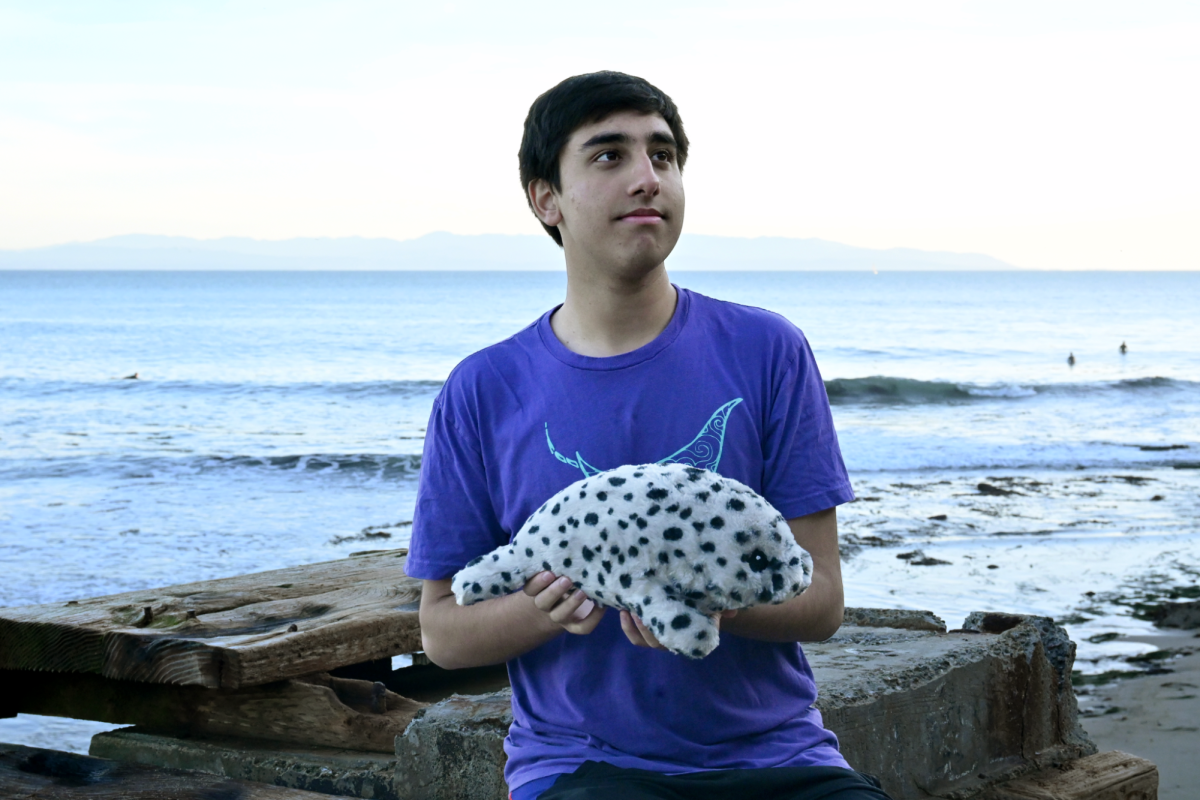On a peaceful afternoon in Sausalito, Calif., pristine, emerald waters stretch for miles in every direction, and jagged rocks dotted with barnacles line the sky’s fog-blanketed edges. But volunteering at the Marine Mammal Center (TMMC) is hardly a quiet job. When the energetic barking of California sea lions, Guadalupe fur seals and harbor seals punctures the crisp ocean air, Neel Handa (12) grabs his bucket of slippery fish — it’s feeding time.
“I did a lot of different things, from cleaning the pens to helping prepare feeds,” Neel said. “As my time continued, the vet started trusting me to work with the medicine and electrolyte mixtures that we had to add to some of their food. It was my first time working with any type of animal outside of pets, so it was nerve-wracking, but at the same time, it was really enjoyable.”
Every Saturday from January to July in his sophomore year, Neel commuted to TMMC in San Francisco County for a six-hour shift. The organization, a marine rehabilitation center, rescues and cares for a wide variety of marine mammals.
“A lot of those animals were victims of various environmental damages that I had to get educated in,” Neel said. “We learn about environmental issues, but it’s much deeper than what we think global warming is. Some animals were there because they got poisoned from algal blooms. So I think people need to be better educated about other effects of global warming, not just the most basic ones that will impact humans.”
A dog owner, Neel noticed a number of differences between his labrador and the different wild animal species he cared for at TMMC. Seal pups had to be treated in a way that would protect their wild instincts — for instance, volunteers used a shield to prevent the pups from seeing them face-to-face.
“When you have a puppy, you can train it, so it’s not going to be aggressive,” Neel said. “It’s a beginner pet, a lot more friendly compared to animals that were born and raised in the wild. The seals are still growing, and we can’t interact with them fully because they have to be released. They can’t be domesticated.”
Friend and fellow dog-owner Aniketh Tummala (12) recalled when he and Neel would bring each others’ dogs to have playdates with each other. He noted a resemblance between their pets’ relationships and their actual relationship as friends — close as ever. And yet, Neel never shows up without refreshing unpredictability.
“Neel really cares about all his friends, and he really wants to make them all happy,” Aniketh said. “You can’t really expect what’s going to happen. It’s always something new with him every day, something new that he’s doing.”
Though his time at TMMC was limited, Neel discovered that the experience extended far beyond a fun weekend activity. He and other volunteers were entrusted with the delicate task of handling and tube-feeding each of the animals separately, learning to navigate their specific feeding schedules and regimens. Working with wildlife and other volunteers taught Neel important life skills that he still applies today.
“You have to be patient,” Neel said. “When you’re restraining an animal for it to be tube-fed, you have to trust that the people around you will keep you safe from the other animals in the pen. If you flinch, it could really hurt the animal or you could get hurt yourself, so you just have to trust.”
A longtime friend of Neel’s, Amit Karoshi (12) watched as he became more outgoing and made lasting connections with those closest to him over the years. He knows Neel as a reliable, caring friend who always has the best advice in store, even when times are tough.
“One of Neel’s biggest strengths is trying to help people as much as he can,” Amit said. “One time, I was really having some issues with a math concept that I was going over, and he just invited me over to his house. We just talked through that subject for like half a day. It worked; it worked really well.”
Neel’s volunteering in TMMC eventually led him to other avenues of marine biology, like scuba diving. After 30 hours of technical training and a trip to Hawaii in the spring, he received an official scuba diving certification.
“I felt amazed,” Neel said. “At that point, I was still getting used to scuba diving because I had always gone two hours underwater at that point. It’s really amazing just being able to be completely underwater; it’s like you’re almost completely weightless underwater. It feels very different and it’s a very unique experience that I hadn’t felt before.”
To avoid the northern California cold, Neel travels to prime scuba-diving locations like Hawaii and San Diego, with Alaska and Monterey on his bucket list. One particular site, located at a Hawaiian pier, captivated him so much that he went on the same dive a second time.
“It looks like an underwater road because the concrete from the pier spreads out everywhere,” Neel said. “You get to dive underneath pieces that have been there for over 50 years now, so everything’s pretty set and safe. There are a lot of cool animals; we saw some reef sharks, octopus and a lot of different fish. Being able to dive between and around objects when you couldn’t see everything was a really cool experience.”
But learning to scuba dive was a process with many trials and tribulations — especially underwater endurance. For one, Neel suffers from asthma. Though it limits his lung capacity, he can last for 50 minutes underwater, a record he’s still working to break.
“When you’re distracted, you’re not really thinking; you’re not actively trying to take deep breaths,” Neel said. “So you go through your air a lot faster, or you overexert yourself by swinging your arms too much when you’re not supposed to use them at all. If you’re not very efficient with how you kick, you’re going to spend a lot more energy, causing you to breathe a lot harder.”
Yet, Neel’s goal-oriented persistence is not limited to his scuba diving ventures. Upper school history teacher James Tate, who taught Neel in AP U.S. History last year, highlights Neel’s keenness to find his own path.
“Neel always has a sense of what he needs to do to get what he wants,” Tate said. “He has a realistic appraisal of where he is in terms of his work and classes and life, and he does what he needs to do to get what he wants out of it. He’s never really lost.”
Worked with wild marine animals in six-hour shifts? Check. Certified scuba diver? Also check. And next on his list, Neel wants to try skydiving. After all, the sky’s the limit — or more accurately, the ocean’s deepest trenches.
“Don’t be afraid to try different experiences,” Neel said. “A lot of stuff seems scary at first. But when you do it, it just turns out to be really fun.”




![LALC Vice President of External Affairs Raeanne Li (11) explains the International Phonetic Alphabet to attendees. "We decided to have more fun topics this year instead of just talking about the same things every year so our older members can also [enjoy],” Raeanne said.](https://harkeraquila.com/wp-content/uploads/2025/10/DSC_4627-1200x795.jpg)


















![“[Building nerf blasters] became this outlet of creativity for me that hasn't been matched by anything else. The process [of] making a build complete to your desire is such a painstakingly difficult process, but I've had to learn from [the skills needed from] soldering to proper painting. There's so many different options for everything, if you think about it, it exists. The best part is [that] if it doesn't exist, you can build it yourself," Ishaan Parate said.](https://harkeraquila.com/wp-content/uploads/2022/08/DSC_8149-900x604.jpg)




![“When I came into high school, I was ready to be a follower. But DECA was a game changer for me. It helped me overcome my fear of public speaking, and it's played such a major role in who I've become today. To be able to successfully lead a chapter of 150 students, an officer team and be one of the upperclassmen I once really admired is something I'm [really] proud of,” Anvitha Tummala ('21) said.](https://harkeraquila.com/wp-content/uploads/2021/07/Screen-Shot-2021-07-25-at-9.50.05-AM-900x594.png)







![“I think getting up in the morning and having a sense of purpose [is exciting]. I think without a certain amount of drive, life is kind of obsolete and mundane, and I think having that every single day is what makes each day unique and kind of makes life exciting,” Neymika Jain (12) said.](https://harkeraquila.com/wp-content/uploads/2017/06/Screen-Shot-2017-06-03-at-4.54.16-PM.png)








![“My slogan is ‘slow feet, don’t eat, and I’m hungry.’ You need to run fast to get where you are–you aren't going to get those championships if you aren't fast,” Angel Cervantes (12) said. “I want to do well in school on my tests and in track and win championships for my team. I live by that, [and] I can do that anywhere: in the classroom or on the field.”](https://harkeraquila.com/wp-content/uploads/2018/06/DSC5146-900x601.jpg)
![“[Volleyball has] taught me how to fall correctly, and another thing it taught is that you don’t have to be the best at something to be good at it. If you just hit the ball in a smart way, then it still scores points and you’re good at it. You could be a background player and still make a much bigger impact on the team than you would think,” Anya Gert (’20) said.](https://harkeraquila.com/wp-content/uploads/2020/06/AnnaGert_JinTuan_HoHPhotoEdited-600x900.jpeg)

![“I'm not nearly there yet, but [my confidence has] definitely been getting better since I was pretty shy and timid coming into Harker my freshman year. I know that there's a lot of people that are really confident in what they do, and I really admire them. Everyone's so driven and that has really pushed me to kind of try to find my own place in high school and be more confident,” Alyssa Huang (’20) said.](https://harkeraquila.com/wp-content/uploads/2020/06/AlyssaHuang_EmilyChen_HoHPhoto-900x749.jpeg)





